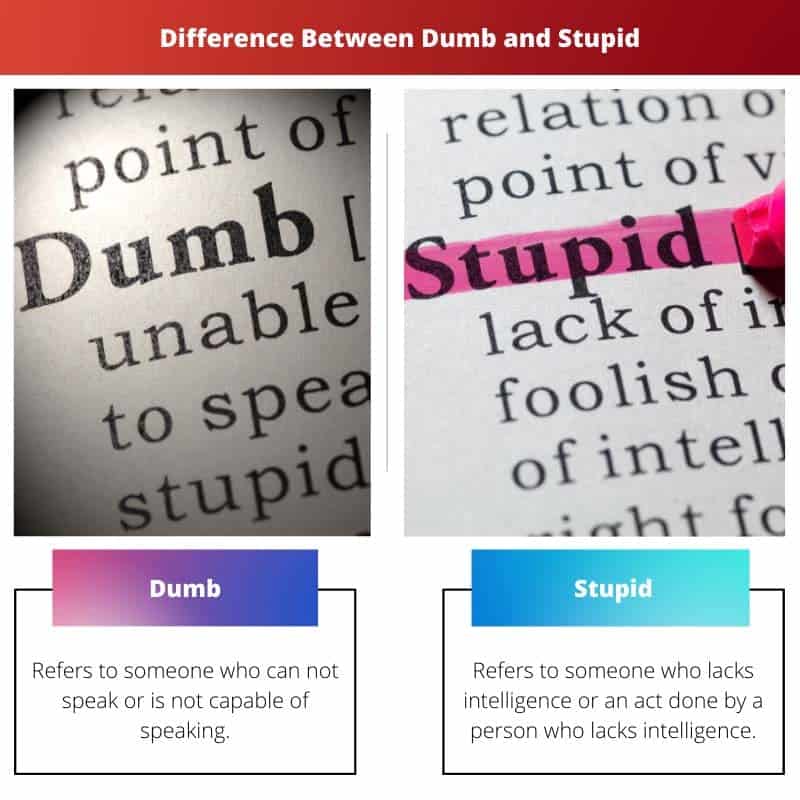Understanding books written in old English is challenging for people dwelling in the present world. It is not easy to comprehend the writings of an old book or an old writer and what the writer wants to convey.
For example, according to the old English language and vocabulary, silly was used to refer to being blessed and worthy. But now, silly is used to refer to foolishly.
Key Takeaways
- Dumb refers to a lack of intelligence or cognitive ability, while stupid refers to a lack of judgment or common sense.
- Dumbness is perceived as a condition that cannot be changed, while stupidity can be corrected through learning and experience.
- Dumbness is a neutral term, while stupidity is considered an insult.
Dumb vs Stupid
“dumb” means being temporarily speechless or unable to speak, a usage originating from its old meaning referring to the inability to speak. “Stupid,” however, solely refers to a lack of intelligence or poor understanding.

Dumb refers to a person who permanently lacks intellectual skills and does not improve over time. Dumb is used on a very informal basis. And it is used within a group of close companions very frequently.
Stupid refers to a person who commits an instantaneous mistake. It is used temporarily and not used to refer someone permanently. Stupid is used less frequently.
Comparison Table
| Parameters of Comparison | Dumb | Stupid |
|---|---|---|
| Adjective | Refers to someone who can not speak or is not capable of speaking. | Refers to someone who lacks intelligence or an act done by a person who lacks intelligence. |
| Meaning (s) | As a verb, it refers to “silence.” | As a noun, it refers to “stupid person,” and as an adverb means the term “extremely.” |
| Parts of Speech | Verb and adjective. | Noun, adjective, and adverb. |
| State | Dumb refers to someone who permanently lacks skills and does not change over time. | Stupid refers to someone for an instantaneous mistake and is not used to refer to someone permanently. |
| Frequency | Used frequently. | Used less frequently. |
| Reference | Physical disability of not being able to speak. | Stupid does not refer to any such physical disability. |
| Example | The whole family thought Edward is dumb, but later, he proved himself to everyone. | Even intelligent people sometimes act stupid. |
What is Dumb?
The term dumb refers to someone who can not speak or is not capable of speaking. Dumb can also be used as a verb referring to silence. The usage of dumb in English can be done by verb and adjective.
In the present scenario, dumb is used for people who are impaired in hearing. Dumb is used in an informal way of using.

What is Stupid?
Stupid refers to a person lacking intellectuality and intelligence. However, it also refers to the actions done by a stupid person.
A stupid person can make the right decisions but repeatedly make the same mistakes unknowingly. They are incapable of learning from their prior mistakes or experiences.

Main Differences Between Dumb and Stupid
- Dumb refers to a physical disability of not being able to speak. However, stupid does not refer to any such physical disability.
- An example of a sentence using dumb is, ” The whole University thought Bella was dumb until she topped University Examinations. ” Whereas the example of a sentence using stupid is, ” Edward’s decision of giving the resignation showed how stupid he can be”.

- https://books.google.com/books?hl=en&lr=&id=xtmQCzIeqTMC&oi=fnd&pg=PR5&dq=dumb+and+stupid&ots=1SsWv6JmYg&sig=YYR16A3fMHFZmMi8wfTf5osBUcc
- https://www.alife.org/wp-content/uploads/2013/08/collections_ECAL93-1090-1103-Webb.pdf